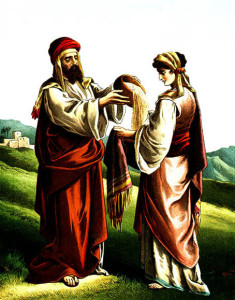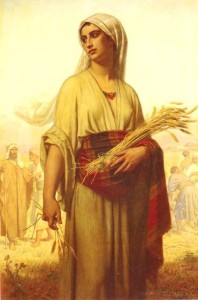The book of Ruth contains wonderful lessons about work, personal responsibility and poverty.
In parts 1 and 2 we started examining the relative responses of Naomi, Ruth and Boaz to economic realities which are very relevant today.
This final post picks up where we left off.
~
 What did Ruth do in response to Boaz’s thoughtful kindness and provision?
What did Ruth do in response to Boaz’s thoughtful kindness and provision?
She worked.
So Ruth gleaned in the field until evening. Then she threshed the barley she had gathered, and it amounted to about an ephah. She carried it back to town, and her mother-in-law saw how much she had gathered. Ruth also brought out and gave her what she had left over after she had eaten enough. 2:17-18
She was a refugee and probably weak from her years of hunger, but Ruth took advantage of the opportunity Boaz had given her. She gathered and threshed the barley and then transported the grain back to town where she and Naomi were staying. This was the midterm supply to meet their needs.
Ruth lived as a free woman in the shadow of the wings of God
Ruth refused to simply accept her fate. She rebelled against her circumstances of hunger and poverty, rejecting the fatalism of her Moabite animistic culture. Ruth lived as a free woman in the shadow of the wings of the living God.
Ruth had worked all day and into the evening to make provision for herself and her mother-in-law. And she provided for Naomi’s immediate need for food: she gave Naomi what she had left over from the meal at Boaz’s home.
How did Naomi respond to what Ruth had done?
Her mother-in-law asked her, “Where did you glean today? Where did you work? Blessed be the man who took notice of you!” Then Ruth told her mother-in-law about the one at whose place she had been working. “The name of the man I worked with today is Boaz,” she said. (2: 19)
Na![]() omi did not ask Ruth where she got food. What question did she ask? “Where did you work?”
omi did not ask Ruth where she got food. What question did she ask? “Where did you work?”
Poverty in the life of an individual or community will not be solved without recognizing the dignity of work. If work is a curse, if the goal is to live without working, the question becomes “Where did you get the food?” But in a more comprehensive framework, the question is “Where did you work?”
Poverty will not be solved without recognizing the dignity of work
Note Ruth’s response. She identified the place where she had been working and the man with whom she had worked. Note as well that Boaz, the landowner, was working in the fields. As a wealthy landowner he might have relaxed. But work is part of human dignity. Not only did Ruth work, so did Boaz.
And finally, Naomi recognizes the role that Boaz is playing in their lives.
“The Lord bless him!” Naomi said to her daughter-in-law. “He has not stopped showing his kindness to the living and the dead.” She added, “That man is our close relative; he is one of our guardian-redeemers.” (2:20)
Boaz is part of the Ephrathite clan and a distant relative of Naomi’s husband. As such he plays the part of the kinsman redeemer for Ruth and Naomi. This term refers to a relative who has a moral and legal responsibility to help extended family members in difficult straits (see Lev. 25:25-55).
In an era of moral bankruptcy, Boaz stood out as a godly man. He fulfilled his responsibility to care for the poor by providing gleanings from his field. The fruits of his labor and his fields were to be shared. He also took seriously his bond as a kinsman redeemer to take Ruth and Naomi under his wing.
The biblical concept of work lifts people out of poverty
Naomi’s life is restored because of the selflessness of Ruth and Boaz. She moves from hopelessness to happiness, from being empty to being filled, from being at serious risk of starvation to food security (1 1-5, 21, 3:17, 4:13-17).
This is the lesson that economic historians have recognized. It is the biblical concept of work that lifts people and communities out of poverty.
Good intentions do not help the poor. Often they create dependency and greater poverty. True service helps the poor in ways that allow their dignity to remain intact, or to be restored. Christlike service enables people to thrive, to move from poverty to flourishing. Boaz understood this and thus offered Ruth, not just a handout, but a way out of poverty.
We need to create opportunity, to encourage entrepreneurship, a spirit of discovery and innovation. These are the attitudes that set people free to create wealth for their families and communities. Enterprise and human freedom are the keys to ending poverty.
A heart for the poor is essential but not adequate. We need to have a mind for the poor, to develop thoughtful activity that actually helps people create wealth. For more on these ideas see this three-minute hard-hitting video from the people at Poverty Cure.
How do we help the poor? Do our misguided good intentions end up actually increasing poverty? Do we do things that are easier for us and perhaps easier for those who are poor? Or do we work alongside people who are impoverished? Do we create opportunities for them to work and to create wealth?
The story of Ruth has much to teach us about these important questions.
- Darrow Miller






